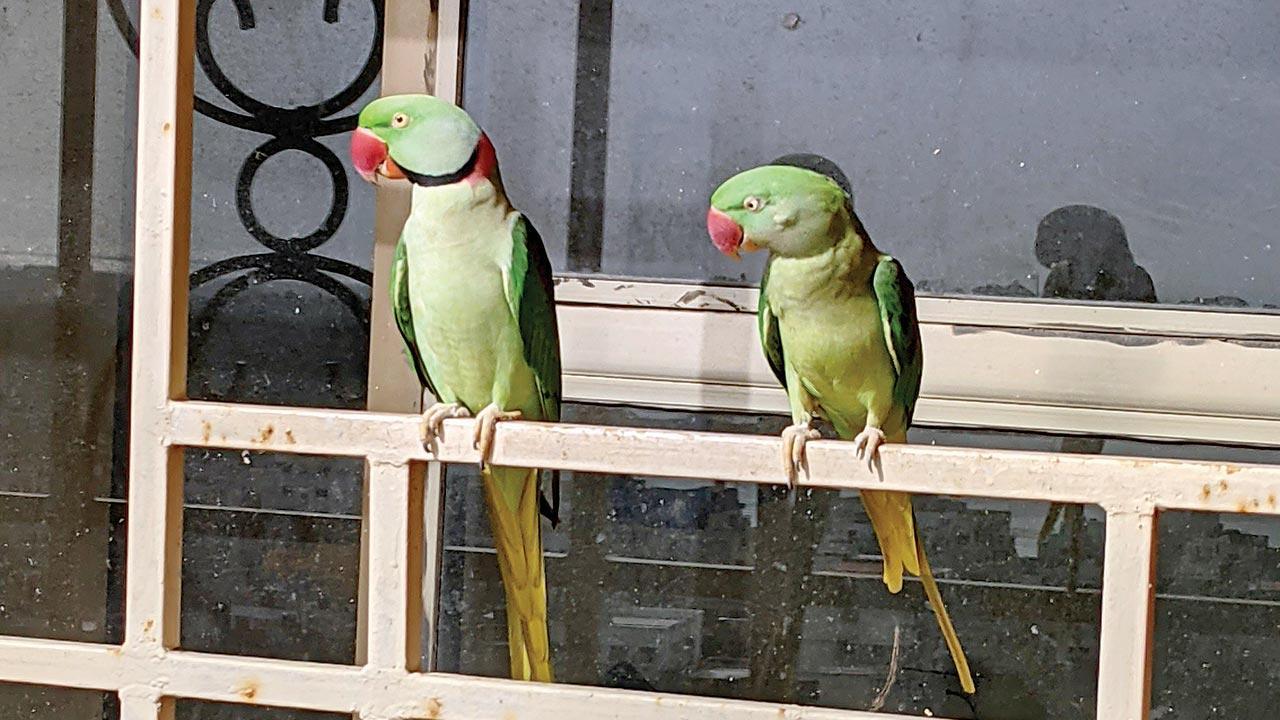Controlled traffic and lower air pollution have brought the parrots home. Avian gurus and surprised bird-watching Mumbaikars discuss how the pandemic-induced lockdowns have changed what they see from their windows.

A pair of parrots sit pretty in a Versova window. Pic/Tania Dey
Darshak Chavarkar and his wife Vijayshree began feeding parrots five years ago and consider these avian guests a part of their family. Pic/Pradeep Dhivar
The number of parrots seen around their window is ever-increasing in the lockdown. But this is not an isolated case. These serendipitous moments are being experienced by many people in the COVID-19 pandemic. When people were compelled to stay indoors 24x7 last year, Radhika Sonawane, a 27-year-old finance professional, saw many birds visiting her Pune home daily. Slowly, the number of parrots taking refuge increased. So, she designed open spaces and set up bird feeders and swings to ensure her avian guests were safe and comfortable. Similarly, Udayan and his family residing in Janakiveedu at Palluruthy in Kerala have been feeding the birds since the lockdown. The rare friendship, which started after the arrival of one parrot, has now grown into a full-fledged family comprising hundreds of birds.
In India, what we commonly see are parakeets. Most common ones seen in urban settings are Alexandrine and rose ringed parakeets. Parrots are social and very friendly creatures, say avian experts. But why are they suddenly getting closer to us humans? Nitya Aggarwal of Wildnest Travel and Photography, which organises nature trips in the country, explains, “The lockdown has led people to become more aware about their natural surroundings and pay more attention to its inhabitants. Parakeets, like other birds and animals, have been regular visitors to homes/places where they get food easily. According to my observation and my interaction with a couple of my friends who have these parakeets as daily visitors, there has not been any major shift in their numbers during this lockdown. They have anyway adapted to the urban environment. The best way to attract them daily is to put bird feeders to give them easy access to food.”
There are nearly 500 parrots visiting Chavarkars’ home in the lockdown. Pic/Ashish Rane
Darshak, on the other hand, feels lesser traffic and air pollution have turned out to be favourable conditions for parrots in urban settings. “I agree we saw hundreds of parrots before the pandemic as well. But now they are breeding a lot more. The numbers are fast-increasing. There is less noise in the city, lesser movement of vehicles, and these reasons are encouraging parrots into our homes,” Darshak shares, adding how it is rare for parakeets to fly to homes situated at lower levels. “We live on the first floor, and usually parrots go to high rises and specifically to flats on a higher floors. My wife and I feel that these birds come to us because they can sense empathy. Long ago, we decided not to have children. Today, we know why God made us take that decision. We were sent to look after these 500-odd parrots instead,” he smiles.
Aggarwal agrees that parrots can sense feelings. “Some species can perceive these in more enhanced ways. Parrots are one of them. So they tend to get attracted to those who are more kind and empathetic towards them. Therefore, many a times hand feeding is not encouraged as their increased trust towards humans can lead them into problems as they could be trapped by other humans with bad intent,” she adds.
Tania Dey, Rohit Kandoth and Nitya Aggarwal
Animal lover Rohit Kandoth, who lives in a verdant neighbourhood in King Circle, had bred Australian love birds in the past, but had not interacted with parrots extensively. “At least, not after I had one in my home for a short while. These birds sit on the trees near my house almost every day. Being a full-time father takes up a lot of my time, but in the lockdown, I began doing my bit by feeding parrots. They like nuts and seeds and are very friendly creatures,” says Kandoth, 49, adding that some are even his muses as he captures them on a professional camera.
Capturing the birds on camera is something Tania Dey, a 34-year-old advertising professional from Versova, enjoys. “I think they have been coming since the last four years. But I have noticed them only in the lockdown. Work from home does that to you; you observe nature more than ever. There is a female parrot who used to come by my 17th floor window before the pandemic. But now, she brings along a male friend with her. She counts on me to keep the pigeons away while they are pecking. They even call out to me as soon as they arrive in the morning. I think these ring-necked parrots come from Madh Island, where there is greenery in abundance. It’s nice to have their company,” Dey shares.
As wild fruits are not feasible options, grains are most suitable, according to Aggarwal. “But one has to make sure that they are properly washed before offering to remove all toxic pesticides that have been sprayed on them. One should refrain from feeding birds junk food that is salty or sweet since it’s toxic for them and does more harm than good.”
The Chavarkars spend close to Rs 25,000 on bird feed every month. “I own a marble shop in Vile Parle. While the lockdown impacted our business, I ensured that I ordered bird food in advance and in bulk. I don’t want them to starve,” Darshak smiles.
 Subscribe today by clicking the link and stay updated with the latest news!" Click here!
Subscribe today by clicking the link and stay updated with the latest news!" Click here!







_d.png)



